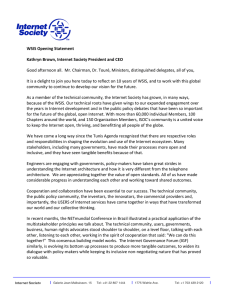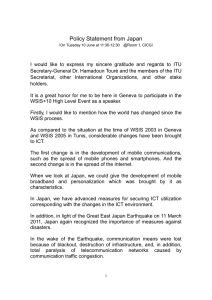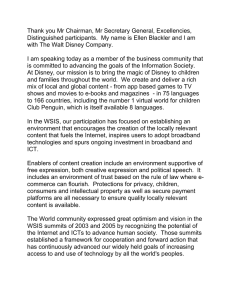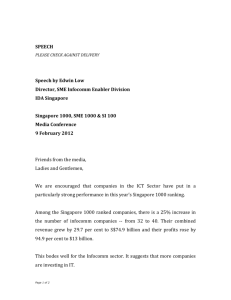SINGAPORE Statement by Singapore at the WSIS +10 HLE (2014) Opening Mr. Chairman,
advertisement
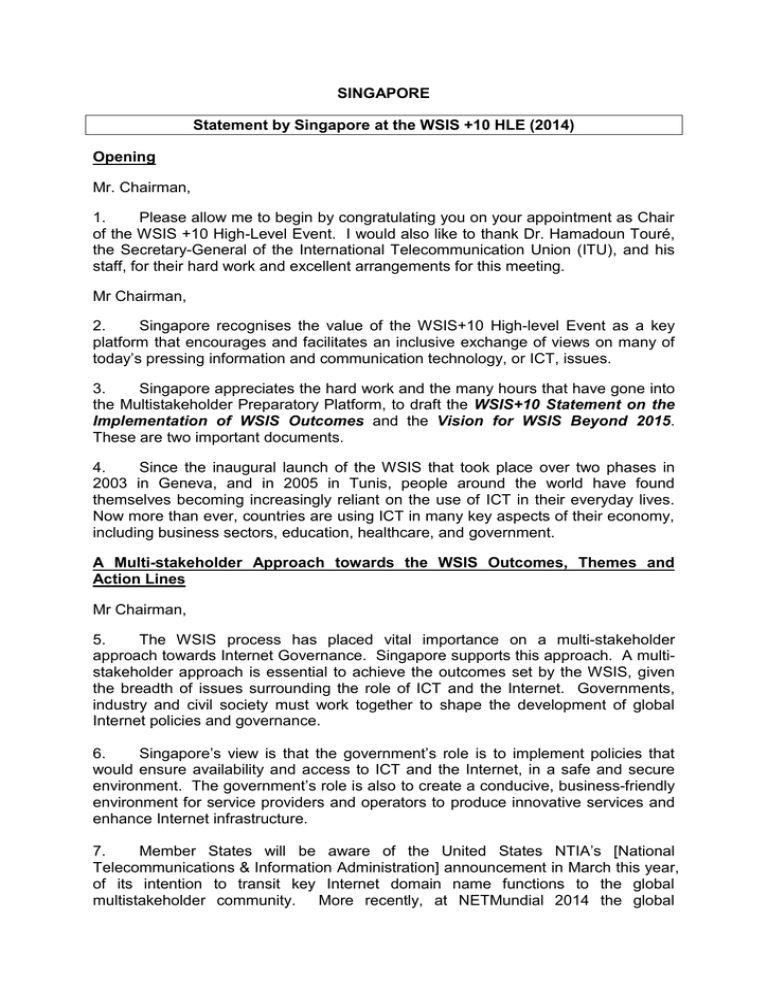
SINGAPORE Statement by Singapore at the WSIS +10 HLE (2014) Opening Mr. Chairman, 1. Please allow me to begin by congratulating you on your appointment as Chair of the WSIS +10 High-Level Event. I would also like to thank Dr. Hamadoun Touré, the Secretary-General of the International Telecommunication Union (ITU), and his staff, for their hard work and excellent arrangements for this meeting. Mr Chairman, 2. Singapore recognises the value of the WSIS+10 High-level Event as a key platform that encourages and facilitates an inclusive exchange of views on many of today’s pressing information and communication technology, or ICT, issues. 3. Singapore appreciates the hard work and the many hours that have gone into the Multistakeholder Preparatory Platform, to draft the WSIS+10 Statement on the Implementation of WSIS Outcomes and the Vision for WSIS Beyond 2015. These are two important documents. 4. Since the inaugural launch of the WSIS that took place over two phases in 2003 in Geneva, and in 2005 in Tunis, people around the world have found themselves becoming increasingly reliant on the use of ICT in their everyday lives. Now more than ever, countries are using ICT in many key aspects of their economy, including business sectors, education, healthcare, and government. A Multi-stakeholder Approach towards the WSIS Outcomes, Themes and Action Lines Mr Chairman, 5. The WSIS process has placed vital importance on a multi-stakeholder approach towards Internet Governance. Singapore supports this approach. A multistakeholder approach is essential to achieve the outcomes set by the WSIS, given the breadth of issues surrounding the role of ICT and the Internet. Governments, industry and civil society must work together to shape the development of global Internet policies and governance. 6. Singapore’s view is that the government’s role is to implement policies that would ensure availability and access to ICT and the Internet, in a safe and secure environment. The government’s role is also to create a conducive, business-friendly environment for service providers and operators to produce innovative services and enhance Internet infrastructure. 7. Member States will be aware of the United States NTIA’s [National Telecommunications & Information Administration] announcement in March this year, of its intention to transit key Internet domain name functions to the global multistakeholder community. More recently, at NETMundial 2014 the global community re-asserted the importance of a multi-stakeholder approach. Singapore welcomes these developments and statements and we look forward to working with the global stakeholder and technical community to construct or evolve the multistakeholder model. Singapore’s Approach to Achieving the Outcomes of the WSIS Agenda 8. Over the last decade, Singapore has worked tirelessly towards aligning its goals in order to achieve the outcomes set by the WSIS. The Intelligent Nation 2015 Masterplan, launched in May 2005, spearheaded a vision to build Singapore into an ‘Intelligent Nation and Global City powered by Info-communications’. Strategic thrusts to enhance economic competitiveness and innovation were identified, including the creation of an intelligent and trusted high-speed next generation broadband network. Today, more than 95 percent of households in Singapore have fibre-to-the-home, which currently provides ultra-high speed broadband access of up to one Giga-bits-per-second (1 Gbps). 9. As part of the Masterplan, Singapore also implemented a number of Digital Inclusion programmes, to ensure that no segment of our society is left out from the benefits of ICT and the Internet. For example, our ‘Silver Infocomm Initiative’ provides access, training and computer resources to the elderly, and the ‘NEU PC Plus (pronounced as New-PC-Plus) Programme’ offers subsidies for the purchase of computers and broadband subscriptions to students, and persons with disabilities, from low-income households. 10. Looking forward, Singapore is consulting with the public and industry on the Infocomm Media Masterplan. When completed in mid-2015, the Masterplan will guide the next phase of development for our infocomm and media sectors from 2015 to 2025. We aim to establish Singapore as a Smart Nation that leads the world in tapping the potential of infocomm and media, and that nurtures innovative talent and enterprises. In this way, the infocomm and media sectors can bring about economic growth and social cohesion, and contribute towards a better quality of life for our people. Conclusion Mr Chairman, 11. While ICT and the Internet have brought about significant benefits, it is clear that there are ongoing challenges where the international community will have to continue to work on together. 12. On this note, Singapore remains committed to working closely with the ITU, fellow Member States, and the telecommunication and Internet industry to promote the development of ICT, encourage greater innovation, and secure the trusted use of the Internet. 13. Thank you.
